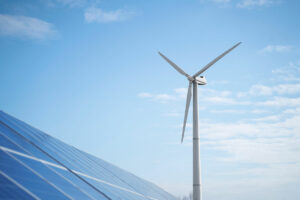UN climate champion urges new administration to boost commitment to tackling climate change

By Arjay L. Balinbin, Senior Reporter
MADRID, Spain — President-elect Ferdinand “Bongbong” R. Marcos, Jr. should strengthen the country’s commitment to tackling climate change to avoid putting it at greater risk, a United Nations (UN) climate champion said.
“Well, I would say to your president (Mr. Marcos) that this is an absolute urgent agenda. It’s an agenda that brings a lot of opportunities as well as many risks if you don’t follow the agenda and integrate it into your policies and the way you run the country,” Gonzalo Muñoz, chairman of the board for the UN climate champions, told BusinessWorld at the recent South Summit 2022, a global business summit in Madrid co-organized by the IE University.
“We cannot allow…the Philippines to be out of the center of the climate action agenda,” he added.
Mr. Muñoz served as the UN’s high-level climate action champion for COP25, or the twenty-fifth session of the Conference of the Parties in 2019.
“There’s no doubt that, in this moment, climate and the environment are strategic and competitive elements for every country in the world. If you don’t embrace the agenda, you are probably putting your nation at a higher risk.”
Climate Reality Project Philippines, a climate advocacy group, said in a statement in May that it expects the Marcos administration to “elevate the Philippines’ position as a formidable champion of climate-vulnerable countries in this critical decade for climate and environmental action,” as the new government’s “success or failure in implementing climate policies will decide who survives and thrives in this country.”
“The new president’s success or failure in leading the country’s transition to a renewable energy system will determine whether or not the Filipino people will finally enjoy cleaner air, healthier communities, and access to clean, reliable, and affordable electricity,” it added.
The group noted that the Philippines experiences “escalating losses” every year due to natural disasters, especially typhoons.
“This cycle of destruction and rehabilitation can only be addressed by deploying science and evidence-based solutions and by ensuring that the global community follows through with its commitment to limit global warming to the critical limit of 1.5 degrees Celsius above pre-industrial levels, as enshrined in the Paris Agreement.”
According to Mr. Muñoz, there is “a big moment” for Southeast Asian countries like the Philippines due to the attention that oceans are gaining.
“The oceans will be much more central to climate discussions… We need to integrate oceans in this moment into both environmental and social solutions.”
“We should have in the second semester of the year the Asia-Pacific Climate week, then I should be going there definitely; and if that allows me to visit the Philippines, I would be delighted,” he added.
The Department of Finance said last year that climate-related hazards have caused P506.1 billion (around $10 billion) in losses and damage to the Philippines over the past decade despite the country contributing only 0.3% of the world’s total greenhouse gas emissions.
Annual average losses of P48.9 billion from climate events represent 0.33% of each year’s average gross domestic product, it noted.
For Socioeconomic Planning Secretary Karl Kendrick T. Chua, climate change adaptation and mitigation must be placed at the center of socioeconomic planning for the Philippines to realize its 2040 goal of eradicating extreme poverty.
“Addressing the triple planetary crisis [of climate change, biodiversity loss, and pollution] has become our top development challenge. If we are to eradicate extreme poverty in the Philippines by 2040 and hand down a better planet to our children and grandchildren, climate change adaptation and mitigation need to be placed at the heart of socioeconomic planning,” Mr. Chua was quoted as saying in a statement on June 7.
According to the National Economic and Development Authority, the government has formulated an action plan for sustainable consumption and production aimed at providing the guiding framework towards the shift to sustainable and climate-smart practices and behaviors across sectors.
The Asian Development Bank (ADB) also recently approved a $250-million policy-based loan to help boost the country’s climate change efforts, noting that the Global Climate Risk Index 2021 ranked the Philippines fourth among countries most affected by extreme weather globally from 2000 to 2019.
“The pandemic has heightened the country’s vulnerability to the economic impact of severe weather events,” it said in a statement.
The ADB said the new program targets policy reforms and is expected to help the country build planning, financing, and institutional systems to scale up climate action. It also aims to improve the resilience of farmers and fisherfolk through sustainable solutions.




